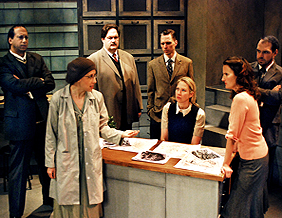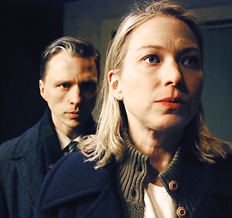From the Chicago Reader
February 13, 2012
By Zac Thompson
Recommended
Axis forces encircled Leningrad for two and a half years during World War II, causing about 650,000 civilian deaths from starvation, disease, and shelling. Elise Blackwell’s 2003 novel, Hunger, centers on a group of botanists trying to survive the siege while protecting their research and not falling afoul of Stalin’s secret police. The irony that they’re starving while studying a food source isn’t lost on them. Chris Hainsworth’s stage adaptation is alternately mordant and mournful, faltering only in its overuse of long monologues to convey novelistic interiority. In Robert Kauzlaric’s harrowing production, an ensemble cast powerfully capture the mix of heroism and ruthlessness required to get through the nightmare alive.
From Chicago On The Aisle
As German bombardment strands Leningrad, political fear feeds desperation in ‘Hunger’
February 28, 2012
By Lawrence B. Johnson
It isn’t the unimaginable, interminably grinding anguish that makes Chris Hainsworth’s new play adaptation “Hunger” so compelling or so strongly to be recommended. It is the portrait — indeed the gallery of portraits — of human behavior in the double press of starvation and political terror.
What’s more, the tale being played out in such graphic, dreadful and yet credible terms at Lifeline Theatre is not some Orwellian fiction but a dramatization of history, the German army’s nearly three-year siege of Leningrad from 1941-44. Cut off from food and water, and under constant bombardment month upon month, hundreds of thousands slowly starved to death.
“Hunger,” adapted from Elise Blackwell’s novel of the same title, reflects the besieged city in the microcosm of a group of Russian botanists doing research on ways to improve crop production. They haven’t been spurred to work by the enemy’s approach; on the contrary, the German advance — which everyone believes will be turned back before it ever reaches the city — comes initially as a distraction from the important laboratory seed studies at hand.
When the Germans actually break through Russian defenses to encircle Leningrad, food grows scarce, then almost impossible to find. Famished citizens begin to consume dogs and cats, even rats. Yet no less a concern for this little family of scientists is a political shift: A competing research team has just won the feared dictator Josef Stalin’s official endorsement.
The disfavored scientists, though desperate like everyone else for food, now also find themselves targeted by the impulsive, paranoid Stalin with charges of spying and other capital offenses — like questioning his scientific choices.
The scientists’ dread of that insistent knock on the door is not unfounded. It can happen day or night: Someone disappears. An ill-considered word against policy is enough. Meanwhile, starvation loom everywhere. It’s an existential nightmare. In short order, the central concern for these besieged souls is no longer plant genetics but personal survival.
Shepherding this chamber ensemble of 12 diverse characters played by seven actors, director Robert Kauzlaric displays a conductor’s flair for musical line and rhythm. It’s not by chance that Lifeline’s fine production brings to mind the tragic, heart-rending music of Dmitri Shostakovich: His Seventh Symphony, which was written and performed during the siege of Leningrad, resonates in the background as these horrific events unfold.
The mix of personalities on view here might be found around any office water cooler — idealists and cynics, the contemplative and the rash. If few in this tightly knit cadre of researchers will survive, none seems better equipped than politically savvy Ilya (John Henry Roberts), a man whose passion for botany also extends to women, never mind that he is married. Roberts’ wary Ilya hews to a center line between caution and self-interest.
On the cautious side, he struggles to rein in his wife and fellow researcher Alena, to whom Kendra Thulin brings a harrowing blend of outspoken idealism and impenetrable naiveté. The more pragmatic Lidia, another researcher and the other woman in Ilya’s immediate life (the lusty and hard-edged Jenifer Tyler), applies all her resources and gamesmanship to weathering the winds of winter and politics.
Perhaps emblematic of the schizophrenic times, every other member of the cast plays multiple roles.
Christopher M. Walsh is stolidly reassuring as the project director who urges forbearance and focus on work. Katie McLean Hainsworth does adroit double duty as a blindered research nerd and an official interloper, the latter an alluring beauty with more than bean sprouts on her mind. Peter Greenberg makes a brilliant reversal from nervous, grimly witty scientist to contained, elegant and dangerous supervisor.
Yet nothing in this carefully drawn production tops Dan Granata’s transformation from ranting scientific critic to dazed, wounded soldier, sent home from the front lines with horror stories that all end with the same bizarre affirmation: “But it goes well.”
Much of the show’s potency springs from the combination of Jessica Kuehnau’s efficient, versatile story-telling set, Kevin D. Gawley’s evocative lighting and Andrew Hansen’s sonic cocktail of German bombs and Shostakovich. I mentioned the Seventh Symphony. At intermission — and I mean during intermission — the music in the lobby was from the Fifth Symphony, the softly sounded, mood-preserving strains of the opening movement: taut, bleak and shrill. It’s an ironic and not at all incidental accompaniment to one’s candy bar, cookie or other handy relief from that first mid-evening hint of hunger.
From Flavorpill.com
February 16, 2012
By Stefanie Gayle McCormack
A painfully beautiful adaptation from Elise Blackwell’s novel, Hunger explores survival in the face of morality. Under the 1941 siege of Leningrad, a group of Soviet botanists make a pact to protect their country’s seed collection and valuable research toward sustainable food resources. This fictional account of what happened to preserve the seeds during the horrifying 900-day Nazi attack is not a cheerful tale. Hunger goes beyond simple nutrition and touches upon the very vices that feed our ego but never quite satiate it: lust, pride, power. Specifically, in the protagonist, Ilya, the audience sees a complete character arc; Ilya’s vulnerability is finally unshelled and appropriately symbolized through a small matryoshka doll. Overall, Lifeline Theatre sets up a Punnett square of humanity, with the unsettling imagery of war on top of uniformly strong acting.
From Gapers Block
February 16, 2012
By Jason Prechtel
Adapted from a novel by Elise Blackwell by Lifeline Theatre, Hunger is based on the true story of a team of Soviet Russian botanists struggling to preserve a collection of edible seeds during the 900-day siege of Leningrad by Nazi Germany. Bombings, food shortages, and the bureaucratic nightmares of Stalinism all test the physical and emotional limits of the scientists as they are forced to confront “hunger” in its multiple forms, and the unpleasant choices that hunger leads to.
John Henry Roberts shone in his role as Ilya, the lead character. I enjoyed the way he revealed new aspects of Ilya as the story progressed, particularly in the scenes exploring the complex relationships between Ilya and his wife, Alena (Kendra Thulin) and between Ilya and his lover, Lidia (Jenifer Tyler) – both fellow botanical genetic researchers in the same Institute of Plant Industry laboratory.
My favorite actor during the performance was Peter Greenberg, who held three roles as a wisecracking scientist Vitalli, a nameless series of government agents/secret policemen, and another fantastic role I won’t spoil whose presence completely shifts the plot and escalates the drama faced by Ilya and the other scientists. It’s a testament to Greenberg’s acting chops that both of his major characters seemed to nearly dominate the scenes when they spoke. Fellow cast members Katie McLean Hainsworth, Christopher M. Walsh, and Dan Granata also played double-duty, dutifully switching between major and minor characters as if they were new actors in the performance.
Director Robert Kauzlaric’s creative use of lighting and set design seamlessly shifted between settings ranging from laboratories and offices to bedrooms and the streets of Leningrad. Original music by Sound Designer Andrew Hansen helped anchor the audience into the World War II-era Soviet setting and heightened the emotion in the scenes.
The best part of Hunger was watching the drama unfold as the characters dealt with more and more suffering, deprivation, and unhappy surprises. Given the subject matter, the performance did an excellent job of building and sustaining the tension between and within the characters. What I did not expect was the dialogue to be so witty – particularly by the characters played by Tyler and Greenberg, with snappy retorts and bitter one-liners that served to reaffirm the dire circumstances around them.
Overall, Hunger is a compelling, tragic, and believable tale about the complications of choosing between duty and basic needs in a time of crisis.
From the Chicago Tribune
Telling an extraordinary story from the Siege of Leningrad
February 14, 2012
By Chris Jones
The new production at the Lifeline Theatre is, in essence, the story of a group of people slowly starving to death. It is a measure of the quality of the acting here — and, looking at the ensemble as a whole, I don’t think I’ve seen a better acted show at this venerable Rogers Park theater — that you find yourself deeply invested in their plight.
The setting for “Hunger,” in a new dramatic adaptation by Chris Hainsworth of the novel by Elise Blackwell, is the Siege of Leningrad during World War II. That was a 872-day offensive wherein German and Finnish forces successfully cut off the frigid Russian city of Leningrad (now St. Petersburg) from the supply lines of the outside world, condemning hundreds of thousands of its desperate citizens to the most horrible of wintery deaths, which came only after some of them had tried to subsist first on a diet of rats and then of each other. To watch this tough-eyed piece is to marvel anew at the chronological proximity of what was clearly an act of genocide on an unthinkable scale, and to muse on how this particular piece of history perhaps has not been given the same cautionary place in human memory as, say, Hiroshima or Nagasaki, even though more people died in Leningrad between 1942 and 1944.
Blackwell’s novel places the focus on a group of food scientists at Leningrad’s Research Institute of Plant Industry who maintain a large collection of rare seeds — seeds that offer the potential to alleviate the famine that is choking the city, if only the party bureaucrats will allow these people of science to do their work. But that is not the condition in which this tight-knit and defiant group operates. And so they take a collective vow to guard the seeds rather than eat them. Yet one by one, the scientists get picked off, either by the pangs of hunger, the limitations of their own bodies or moral compasses, or by a knock on the door from the KGB.
Aside from chronicling the historical horror, Blackwell explores the complexity of human needs (the researchers’ sexual appetites ebb and flows with their intake of food), whether scientists must always adhere to the truth or whether expedient lies to government masters are justified in dire circumstances, and, first and foremost, the moral question of whether it’s better to fight to your own death to preserve the potential nutrition of others, or just eat the darn seeds and make sure you remain alive to tell the story.
Hainsworth’s adaptation has not yet been wholly shaped into a workable play. For much of the first act, we’re taught to see this group as collective protagonists, only for the focus to drastically shift after intermission to the character of Ilya (John Henry Roberts), the central voice in the novel but not, naturally, the central focus of the drama.
Rather than feel the pulse of increased, present-tense drama amid the salient questions above, we get interrupted by the badly timed back stories to how Ilya came to marry his wife (played by Kendra Thulin) and sleep with his colleague (Jenifer Tyler). And the more we disappear inside John’s character, the more the bigger issues of the siege seem to retreat.
The piece travels widely throughout the city, with numerous flashbacks of questionable worth to research in other countries, when the drama would surely be intensified if everyone stayed focused on what happened in the laboratory. This is a common problem with new adaptations, of course. The adapter wants to be true to the source, but novels and plays don’t work the same way. This one has yet to really grab its ensemble of compelling characters and make them fight in out in the moment.
That said, director Robert Kauzlaric has found some formidable actors, ranging from Dan Granata, who plays a moody idealist, to Tyler, who plays a sensualist, withering, before our eyes, on the vine. Thulin, whose character is a well-meaning scientist and loyal spouse, is exceptionally moving throughout, as is Peter Greenberg, playing an altruistic sage, familiar with the non-scientific morass within which all people of science must operate. And Roberts, who is on something of a roll of late, delivers a twitchy, nervous, restless guy, constantly watching to see who’s listening to whom, negotiating for power and coming to hate no one so much as himself. It is, truly, an exceptional ensemble of Chicago actors at their peak of their games.
There are, for sure, a few clunky bits of theatricalism in Kauzlaric’s production: we don’t need the drawers of seeds to throb with light at telling moments or for scenes to pop up from drawers. We just need these actors in a room, fighting things out as they try to stay alive in a world of malevolent ignorance.



















